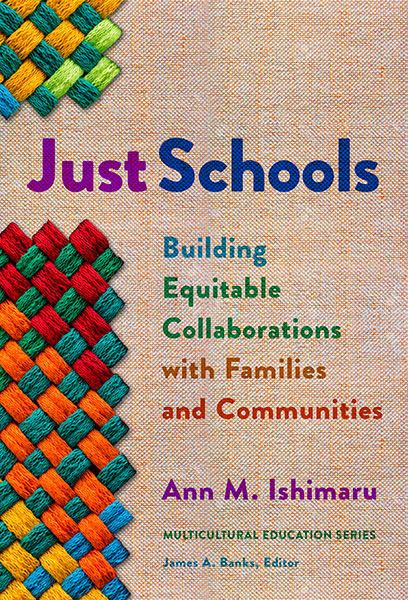Professors: Request an Exam Copy
Print copies available for US orders only. For orders outside the US, see our international distributors.
Publication Date: December 27, 2019
Pages: 216
Series: Multicultural Education Series

“Ishimaru’s book provides an imaginative and inspiring approach.” —Teachers College Record
“Full of practical steps that educators and administrators can and must take to build strong collaborations with families.” —Mark R. Warren, University of Massachusetts Boston
Just Schools examines the challenges and possibilities for building more equitable forms of collaboration among nondominant families, communities, and schools.
This popular text explores how equitable collaboration entails ongoing processes that begin with families and communities, transform power, build reciprocity and agency, and foster collective capacity through collective inquiry. These processes offer promising possibilities for improving student learning, transforming educational systems, and developing robust partnerships that build on the resources, expertise, and cultural practices of nondominant families. Based on empirical research and inquiry-driven practice, this book describes core concepts and provides multiple examples of effective practices.
Book Features:
Ann M. Ishimaru is an associate professor of educational policy, organizations, and leadership at the University of Washington College of Education.
“Research and praxis that seek to resist and transform the growing inequity and racism in the United States are essential to transform schools into sites of justice. Ishimaru’s book provides an imaginative and inspiring approach for school communities to persist in this work.”
—Teachers College Record
“Just Schools makes a bold and vital contribution to education reform by challenging educators to include parents as vital leaders in school transformation and community development. Empirically rich and theoretically sophisticated, the book is also full of practical steps that educators and administrators can and must take to build strong collaborations with families that will produce desperately needed equity-oriented changes in schools, school systems, and their surrounding communities.”
—Mark R. Warren, professor of public policy and public affairs, University of Massachusetts Boston
“Ann Ishimaru's book is the most compelling work to date on school and community engagement. The data is gripping, and not only presents multiple models of how educators can follow community-based ways of engagement, but also proves deeply useful for parents that seek to better understand and navigate schools that have struggled to serve their communities well. Deep and complex theories and histories around race, power, and privilege in school and community are articulated in powerful and accessible ways, making this a must-read for educators and scholars alike. It will be required reading for all my future classes.”
—Muhammad Khalifa, Beck Chair of Ideas in Education, University of Minnesota
“This important publication provides a way forward for educators, families, students, and community members to co-create “just schools” by honoring, validating, and celebrating one another’s knowledge, skills, power, and resources. This book underscores that systemic and sustainable transformation toward equity will only be achieved through the process of creating equitable collaborations that embrace, include, and honor all members of our communities.”
—Karen Mapp, Harvard Graduate School of Education
Contents (Tentative)
Series Foreword James A. Banks
Acknowledgments
Introduction
Situating “What Counts” for Families in Education
Beyond Critique to Fostering Equitable Collaborations
Showing Up in the Work
A Few Notes on Language
Organization of the Book
Equitable Collaborations in Reaching for Transformation
1. Fuzzy Families, Prickly Racism: Framing the Problem Space
Start with Warm Fuzzies: Families Matter
Enter the Cold Pricklies: Racial Inequities from Parent Involvement to Family Engagement
Conclusions: From Involvement and Engagement Toward Equitable Collaboration
2. New Rules of Engagement: From Conventional Partnerships to Equitable Collaborations
Why Equitable Collaborations? Critical Race Theory, Community Organizing, and Sociocultural Learning
Toward Equitable Collaborations: Case Study of a “New Relationship”
A Changing Community: Traditional Approaches, Deficit Conceptions
“We Had to Take Action”: New Roles for Parents in the Formation of the Coalition
A Collaboration Emerges: Shared Responsibility for Systemic Change GOALS
Capacity- and Relationship-Building STRATEGIES for Systems Change
“Navigating Insecure Ground”: Change Processes at the End of the Honeymoon
Case Discussion: A “New Relationship”
Conclusions
3. Nondominant Families on Their Own Terms: Lived Theories of Educational Injustice
Introduction
Nondominant Family Insights as Lived Theories of Injustice
“They Just Want to Pass the Kids”: Systemic Dynamics of Accountability Policy and Equitable Learning
“Are You Speaking for Yourself or for All the Parents?”: Power and Engagement at the School Level
Listening to Respond: Inequities in the Moment at the Individual Level
Conclusions
4. Systemic Collaborations: Multiorganizational Educational Equity Initiatives
Cross-Sector Collaborations: New Policy Contexts for Engagement
New Context, Familiar Territory: Contextualizing Education Beyond the School Walls
Cross-Sector “Collabetition”: Reinforcing Interorganizational Inequities
Cultural Brokering as Bridging
Emerging Approaches to Equitable Cutural Brokering
Conclusions
5. Collaborating in Organizational Improvement: Data Inquiry with Families, Communities, and Educators
Conceptualizing Relationships Between Families and Data
A Model of Data Inquiry for Equitable Collaboration
Questioning Phase
Engaging Phase
Making Sense Phase
Tensions and Opportunities in Strategizing and Moving to Action
Conclusions
6. Rewriting Moment-to-Moment Interactions: Families as Co-designers
Racialized Institutional Scripts in Family–Teacher Relations
Changing Racialized Institutional Scripts
Putting Principles into Practice in Participatory Design-based Research
Co-design Practices as Rewriting Racialized Institutional Scripts
Repositioning Racial and Cultural Differences
Conclusions
7. Co-designing Justice and Well-Being with/in Systems and Conclusions
A Call to Reimagine Family and Community Engagement
District Leaders and Co-design
My Teaching Challenge: Proleptic Politic as Pedagogy
Dilemmas as Systemic Tensions
Co-design as “Solidarity-Dreaming”
On Solidarities
Conclusions (and New Openings)
Appendix A: Initial Partnership Assessment Tool
Appendix B: Final Lesson Topics and Design Principles
Notes
References
Index
About the Author
Join Ann Ishimaru, Muhammad Khalifa, and Megan Bang as they discuss this book and the challenges and possibilities for building more equitable forms of collaboration among nondominant families, communities, and schools.
Professors: Request an Exam Copy
Print copies available for US orders only. For orders outside the US, see our international distributors.